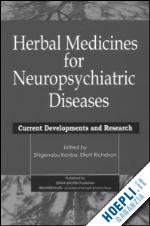From the 19th Collegium Internationale Neuro-psychopharmacolgicum (CINP) Congress in 1994 comes this long-awaited collection that explores traditional herbal medicines as they relate to the treatment of neuropsychiatric diseases today. Dr. Shigenobu Hanba, co-chair of the symposium, joins together with co-editor Dr. Elliot Richelson and other distinguished scientists from around the world to discuss the role that age-old medicinals can play in modern-day therapy. For clinical and basic scientists alike, Herbal Medicines for Neuropsychiatric Disorders provides a comprehensive overview of the status of traditional herbal medicines as they relate to the treatment of neurospychiatric diseases. It will also serve as a source for detailed information on specific natural products and their constituents, as well as a reference point from which to begin a more in-depth exploration of this fascinating field.
Eastern cultures have been using herbal medicines for centuries and mainstream practitioners in many countries continue to use them as valid and effective forms of therapy for neuropsychiatric disorders. An important exception in Western culture, of course, is the United States, where governmental standards for safety and efficacy often pose obstacles for the speedy approval of drugs based on what some might label folkloric remedies. However, in the U.S. today, scientists are now conducting research with traditional herbal medicines with the belief that they offer enormous possibilities for the discovery of new drugs that would provide the basis of a new and effective psychopharmacology.
Along with detailed information on this research, the readers of Herbal Medicines forNeuropsychiatric Disorders explore ancient cultures to gain a greater perspective on the herbal medicines of Japan, China and India. Further reading offers chemical and pharmacological studies of various herbal medicines, as well as reports of studies in which behavioral and biochemica











